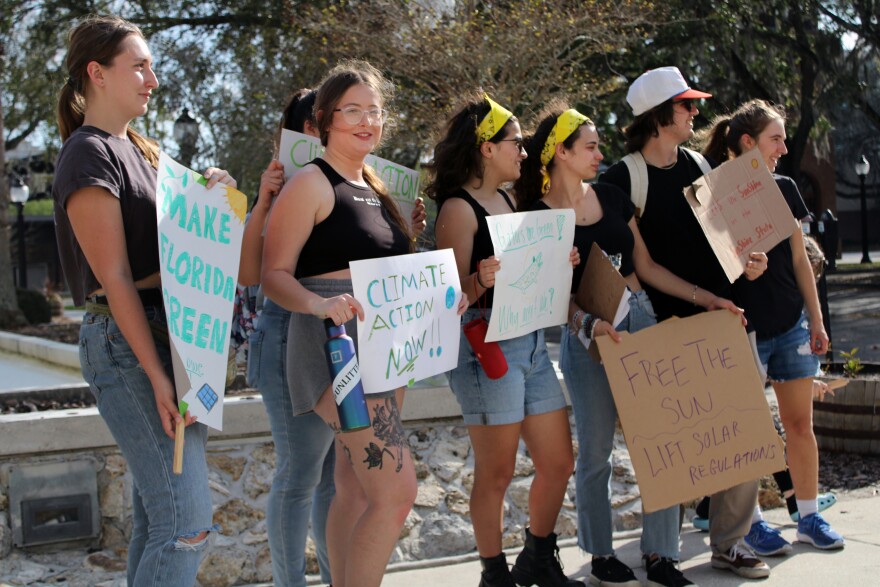Shouting at the top of her lungs, “Hey Hey, Ho Ho, climate change has got to go,” while marching through Downtown Gainesville in the late afternoon heat, Madeline Stewart waved around a sign that read “Make Florida Green. You owe us.”
Stewart, a 21-year-old University of Florida political science and sustainability student, said she was ready to start acting if it meant getting the government more involved with the climate crisis.
“I always kind of believe in putting your actions behind your words,” she said. “I think I've been too inactive with everything going on in terms of climate action and environmentalism. I kind of want to put my actions behind my words.”
On Friday, Sunrise Movement Gainesville — a local branch of the youth climate action group Sunrise Movement — staged a protest centered around climate change that began at City Hall and ended at the Heartwood Soundstage.
More than 15 members of the community marched through downtown to vocalize their growing concerns for the climate — specifically in the state of Florida.
This march focused on the solar regulations enacted by the Florida Public Service Commission regarding solar power purchase agreements.
A solar PPA is when a third-party solar company comes to a home or a business and installs solar panels that it owns and operates, Jordyn Golden, a 21-year-old organizer of the march, said. The company also forms a contract with either the homeowner or building owner to establish a fixed rate for the use of the solar panels.
“We're focusing on the legalization of solar PPAs, because right now solar PPAs are illegal in the state of Florida,” Golden said.
As the Sunshine State, freeing up the solar market and allowing Florida to access renewable energy is important, she said.
But that’s not the only issue concerning Florida.
David Hastings, now co-treasurer of the Sierra Club Suwannee St. Johns Group, used to study sediments of the oceans and how climate has changed over geological time.
“What we do know is that it's getting very hot very quickly,” he said. “If we don't transition quickly to doing things in a different way, it's just going to be too hot…what's important is that we can change things around. It's not too late.”
After the protest, organizers from the Sunrise Movement Gainesville hosted an event at Heartwood Soundstage to spark more conversation about climate action in the community.
“The language that they put out online, it's kind of more difficult to digest,” Golden said.
The event had keynote speakers like Kevin Endres, chief operations officer at Solar Impact, David Arreola, former Gainesville commissioner, Stephen Mulkey, a climate scientist, and Danielle Hawk, former district three representative candidate. They touched on the urgency of the climate crisis and legislation that could either help or hinder the fight for climate action.
The expansion of PPAs allows different types of communities to utilize solar power, Endres said, which ultimately can help low-income communities access renewable energy.
“We have an absolute and strict moral obligation to protect our natural resources, to hold them in trust for the future,” he said in his speech. “Anything that stands in the way of that needs to be resisted very, very strongly.”
Although some of the speakers study the climate professionally, the goal is to make the information more digestible to the public, Golden said.
As fighters for change at a state level, attendees of the march also said more can be done at a local level by evolving the state-wide net-metering legislation.
Net-metering in Florida allows customers with renewable energy systems — like solar panels — to buy and sell unused electricity, according to Florida Power and Light, one of the largest power companies in the state.
Florida law states that renewable energy systems cannot exceed more than a two-megawatt net-metering limit, and for big institutions like UF, it encourages using less clean energy.
The net-metering limit makes it so they are only able to build up to four megawatts of solar power generators on campus, Golden said.
“We're pretty much advocating to lift that four-megawatt limit because it's a very outdated limit that shouldn’t be there and to make it so the university can hypothetically put as much solar on campus as needed,” she said.
Of the potential four megawatts that could be utilized, UF uses only 352 kilowatts. That leaves enough solar energy to power roughly 2,625 houses.
Although it’s not a primary demand, Sunrise Movement Gainesville advocates for the use of all four megawatts that are offered to the university with the two-megawatt net-metering limit in place.
Renewable energy was the primary motivation behind this march, but attendees like Johanna Walker, a senior at UF pursuing environmental studies, feel climate injustice is another significant effect produced by climate change.
“They might not realize that climate change is going to impact vulnerable communities differently — under-resourced communities, low-income, people of color,” she said. “That’s one reason why we're here. We’re fighting for climate action, PPAs, lifting the regulations off so they’re more accessible to people.”
Climate change affects everyone, but vulnerable communities that can’t afford solar panels or higher utility bills get hit harder, she said.
The science makes it pretty clear that there’s been a lot of damage done to the environment, Golden said.
“If we do not stop it, then other generations are going to suffer immensely,” she said. “It's really just bringing awareness to the urgency of the situation and that people need to act now.”






